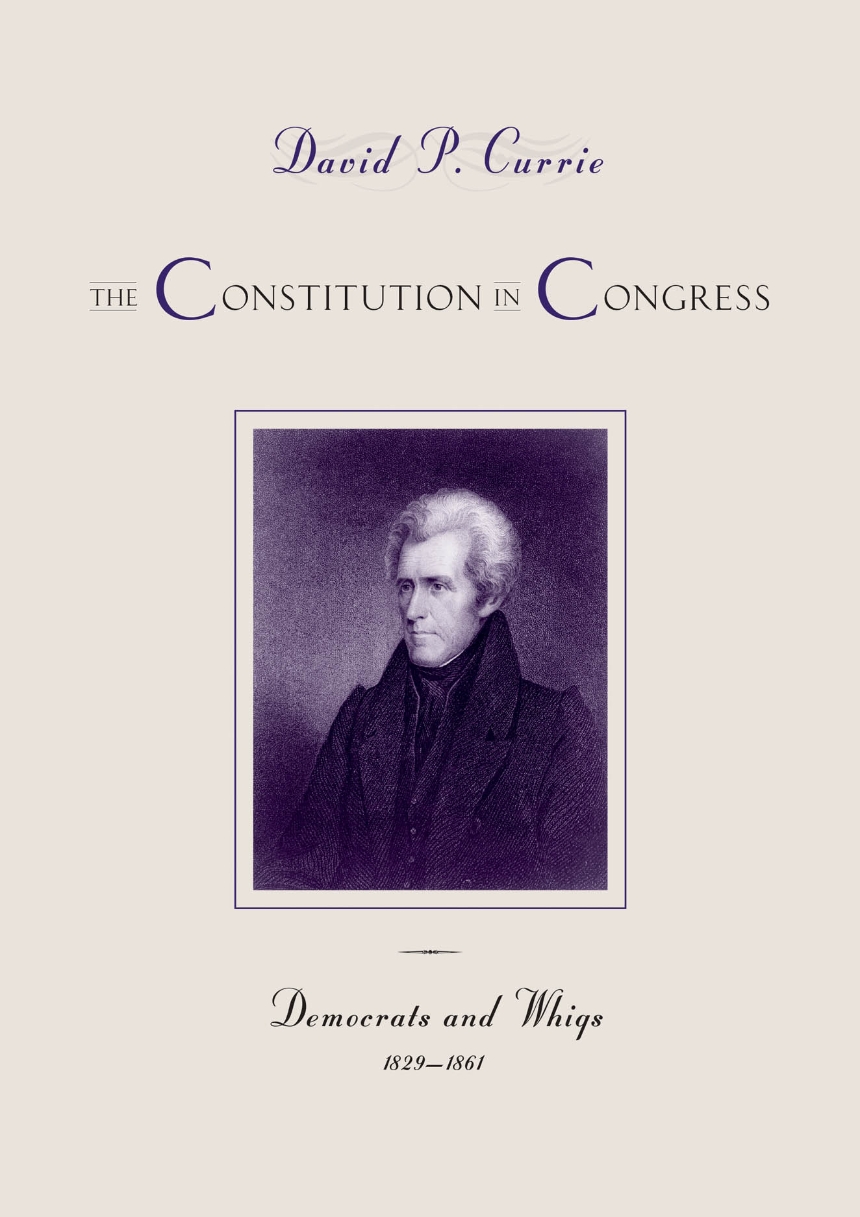The Constitution in Congress: Democrats and Whigs, 1829-1861
The Constitution in Congress series has been called nothing less than a biography of the US Constitution for its in-depth examination of the role that the legislative and executive branches have played in the development of constitutional interpretation. This third volume in the series, the early installments of which dealt with the Federalist and Jeffersonian eras, continues this examination with the Jacksonian revolution of 1829 and subsequent efforts by Democrats to dismantle Henry Clay’s celebrated “American System” of nationalist economics. David P. Currie covers the political events of the period leading up to the start of the Civil War, showing how the slavery question, although seldom overtly discussed in the debates included in this volume, underlies the Southern insistence on strict interpretation of federal powers.
Like its predecessors, The Constitution in Congress: Democrats and Whigs will be an invaluable reference for legal scholars and constitutional historians alike.
Like its predecessors, The Constitution in Congress: Democrats and Whigs will be an invaluable reference for legal scholars and constitutional historians alike.
368 pages | 6 5/8 x 9 3/8 | © 2005
History: American History
Law and Legal Studies: Legal History, The Constitution and the Courts
Reviews
Table of Contents
PREFACE
ABBREVIATIONS AND SHORTENED TITLES
Part One: Death of a System
INTRODUCTION TO PART ONE
CHAPTER 1: INTERCOURSE
I. The Maysville Road
II. Rivers and Harbors
III. Ebb Tide
IV. The Undelivered Veto
V. Congress Insists (A Little)
VI. Tonnage Duties
VII. The Iron Horse
VIII. The Golden Gate
IX. The Telegraph
CHAPTER 2: THE PUBLIC LANDS
I. The 1833 Distribution Bill
II. The 1841 Distribution Law
III. The Mad
IV. The Learned
V. The Footloose
CHAPTER 3: THE BANK WAR
I. President Jackson’s Veto
II. Removal of the Deposits
A. The Statute
B. The President’s Powers
C. Censure and Protest
D. Expungement
E. Ruminations
III. State Banks and State Treasuries
IV. And Tyler Too
CHAPTER 4: CUSTOMS
I. The South Carolina Exposition
II. The Hayne-Webster Debate
III. The Nullification Ordinance
IV. President Jackson’s Response
V. The Compromise of 1833
VI. Cadenza
Part Two: The Kitchen Sink
CHAPTER 5: ENUMERATED AND LIMITED POWERS
I. Admiralty and Commerce
II. The Broken Bench
III. The Smithsonian
IV. Retrocession
V. Prayers
VI. Spoils
CHAPTER 6: PRESIDENT, VICE-PRESIDENT
I. The Veto
A. The President’s Pocket
B. Tippecanoe
C. Mr. Tyler and the Bank
D. Mr. Clay’s Amendment
E. Mr. Tyler and the Tariff
F. Winding Down
II. The Appointing Power
III. The Sanctity of the Cabinet
IV. His Accidency
V. Casting Votes and Other Quiddities
CHAPTER 7: ALL ABOUT JUDGES
I. The Impeachment of Judge Peck
II. Another Who Got Away
III. The Wheeling Bridge
IV. The Court of Claims
V. Good Behavior
CHAPTER 8: MORE MISCREANTS
I. Sam Houston
II. Miss Otis Regrets
III. The Caning of Senator Sumner
IV. The Sins of Orsamus Matteson
V. Immunity
CHAPTER 9: JUDGING CONGRESSIONAL ELECTIONS
I. Threshold Questions
II. Vacancies
A. Mississippi
B. Kentucky
C. Vermont
III. The Three I’s
A. Illinois
B. Eligibility Encore
C. Indiana and Iowa
CHAPTER 10: OTHER ELECTION ISSUES
I. Districts
A. Time, Place, and Manner
B. Co-Opting the States
C. Undoing the Deed
II. The Speaker
III. The Snowstorm of 1856
CONCLUSION
APPENDIX A. DRAMATIS PERSONAE
APPENDIX B. PRINCIPAL OFFICERS, 1829-1861
APPENDIX C. THE CONSTITUTION OF THE UNITED STATES
INDEX
ABBREVIATIONS AND SHORTENED TITLES
Part One: Death of a System
INTRODUCTION TO PART ONE
CHAPTER 1: INTERCOURSE
I. The Maysville Road
II. Rivers and Harbors
III. Ebb Tide
IV. The Undelivered Veto
V. Congress Insists (A Little)
VI. Tonnage Duties
VII. The Iron Horse
VIII. The Golden Gate
IX. The Telegraph
CHAPTER 2: THE PUBLIC LANDS
I. The 1833 Distribution Bill
II. The 1841 Distribution Law
III. The Mad
IV. The Learned
V. The Footloose
CHAPTER 3: THE BANK WAR
I. President Jackson’s Veto
II. Removal of the Deposits
A. The Statute
B. The President’s Powers
C. Censure and Protest
D. Expungement
E. Ruminations
III. State Banks and State Treasuries
IV. And Tyler Too
CHAPTER 4: CUSTOMS
I. The South Carolina Exposition
II. The Hayne-Webster Debate
III. The Nullification Ordinance
IV. President Jackson’s Response
V. The Compromise of 1833
VI. Cadenza
Part Two: The Kitchen Sink
CHAPTER 5: ENUMERATED AND LIMITED POWERS
I. Admiralty and Commerce
II. The Broken Bench
III. The Smithsonian
IV. Retrocession
V. Prayers
VI. Spoils
CHAPTER 6: PRESIDENT, VICE-PRESIDENT
I. The Veto
A. The President’s Pocket
B. Tippecanoe
C. Mr. Tyler and the Bank
D. Mr. Clay’s Amendment
E. Mr. Tyler and the Tariff
F. Winding Down
II. The Appointing Power
III. The Sanctity of the Cabinet
IV. His Accidency
V. Casting Votes and Other Quiddities
CHAPTER 7: ALL ABOUT JUDGES
I. The Impeachment of Judge Peck
II. Another Who Got Away
III. The Wheeling Bridge
IV. The Court of Claims
V. Good Behavior
CHAPTER 8: MORE MISCREANTS
I. Sam Houston
II. Miss Otis Regrets
III. The Caning of Senator Sumner
IV. The Sins of Orsamus Matteson
V. Immunity
CHAPTER 9: JUDGING CONGRESSIONAL ELECTIONS
I. Threshold Questions
II. Vacancies
A. Mississippi
B. Kentucky
C. Vermont
III. The Three I’s
A. Illinois
B. Eligibility Encore
C. Indiana and Iowa
CHAPTER 10: OTHER ELECTION ISSUES
I. Districts
A. Time, Place, and Manner
B. Co-Opting the States
C. Undoing the Deed
II. The Speaker
III. The Snowstorm of 1856
CONCLUSION
APPENDIX A. DRAMATIS PERSONAE
APPENDIX B. PRINCIPAL OFFICERS, 1829-1861
APPENDIX C. THE CONSTITUTION OF THE UNITED STATES
INDEX
